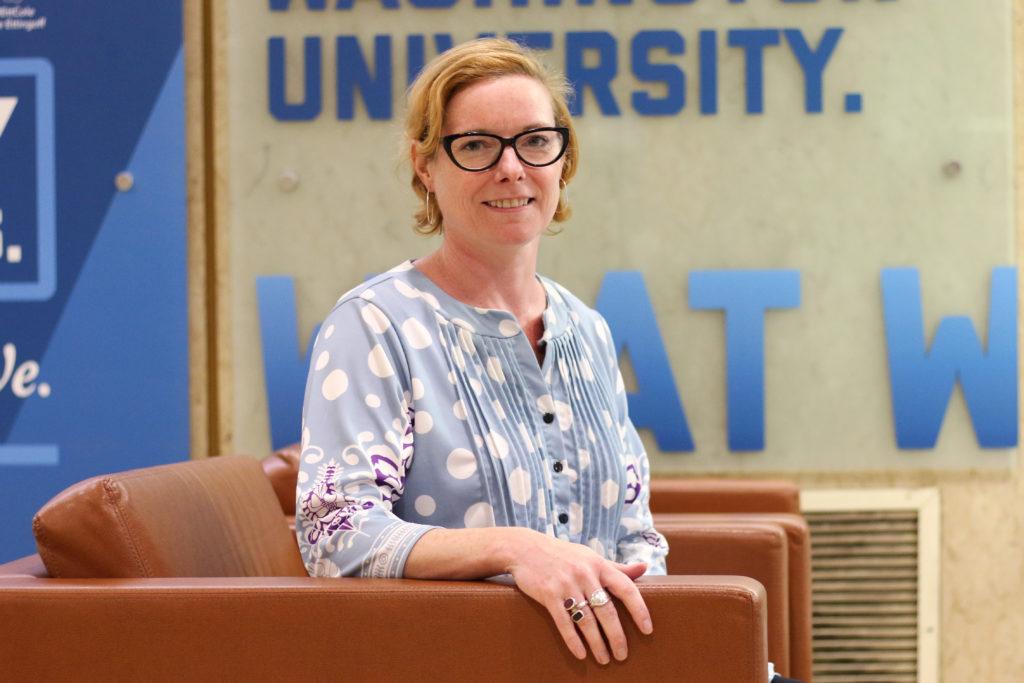The University is rolling out the first two of several new living and learning communities on the Mount Vernon Campus this fall.
More than 100 members of the Class of 2023 will be a part of the first cohorts of the sustainability and global connections living and learning communities, officials said. They said the new programs will connect students based on common academic interests and help build on already-existing living and learning communities on the Vern, like the Women’s Leadership and Politics and Values programs.
“We chose sustainability and global connections because these are two areas that students are passionate about,” Teresa Murphy, the deputy provost for academic affairs, said. “The goal is to bring students together around topics that have intellectual value and are not simply tied to filling requirements for general education or a major.”
Murphy said officials plan to expand the number of living and learning communities on the Vern to eight to 10 “during the next couple of years.” She said the additions are part of an administrative effort to build up “intellectual and social life” on the Vern, which she said feels similar to a small liberal arts institution at a large university.
The addition of the sustainability and global connections communities ups the total number of living and learning communities to five, alongside the Politics and Values, Women’s Leadership and Civic House communities, according to a University website.
Murphy said about 40 students will be a part of the sustainability community, and about 75 students will be accepted to the global connections community. Both programs will be housed in the hillsides residence halls, which include Merriweather, Cole, Hensley and Clark halls, she said.
“Sustainability is a world challenge, and many of our students, as seen through their interest in the sustainability minor and their involvement with SustainableGW, are eager to create change and work towards a more sustainable world,” Murphy said. “Similarly, global connections highlights an interest that so many of our students have to be part of a global world.”
She added that students were chosen to be a part of the communities based on “who expressed interest.”
Murphy said students in each of the programs will attend seminars based on the subject of their communities. Each group will also participate in social activities related to their topics, she said.
Murphy said offices like Sustainable GW, the International Services Office and the Office for Study Abroad will plan activities and events for the communities related to their areas of focus. She added that faculty teaching courses in the communities will be able to request funding to invite speakers to community events.
The University will hire one visiting professor for the sustainability community and two visiting faculty for the global connections community, Murphy said. She added that the faculty will be members of the Mount Vernon Society of Fellows, a new group of postdoctoral fellows who will teach students in the communities.
Elizabeth Chacko, the new associate provost for special programs and the Mount Vernon academic experience, will oversee the new living and learning communities.
Faculty in the sustainability program said the new eco-friendly living and learning community will teach students about the ins and outs of living sustainably, like recycling certain materials. The initiative will also introduce students to the growing sustainability minor, they said.
Tara Scully, the director of the sustainability minor and the co-director of sustainability initiatives, said the living and learning community will provide a physical space on the Vern for students to practice sustainable living together by composting, recycling and buying local produce.
She said sustainability faculty, student organizations and other community leaders will also host panels and film screenings with members of the community to introduce first-year students to sustainability initiatives on campus.
“Having the ability to come right in freshman year and identify people who have like-minded ideas and being able to talk about those ideas together is very helpful,” Scully said. “It makes you feel more connected and grounded in a community within a very big community.”
Experts on academic residential programs said living and learning communities could help students feel at home and make friends by providing them with a small group of peers with shared interests. They said the groups also expose students to new topics and give them an opportunity to learn about a subject in-depth without majoring in the topic.
Stephen Deaderick, the assistant director of living-learning communities, assessment and training at Tulane University, said the small size of the communities helps students gather around similar interests within larger residence halls. He said the eight residential learning communities at Tulane include about 30 students each.
“I think that’s definitely a huge benefit to residential life, making it feel more intimate and having that kind of subset within the larger residence hall,” he said.
Emily Sandoval, the senior director for residential education at the University of Southern California, said living and learning communities can help first-year students turn an interest into a major or minor.
“It’s so important for students to be able to explore – that way they can continue as they form their own identity as college students,” she said.





